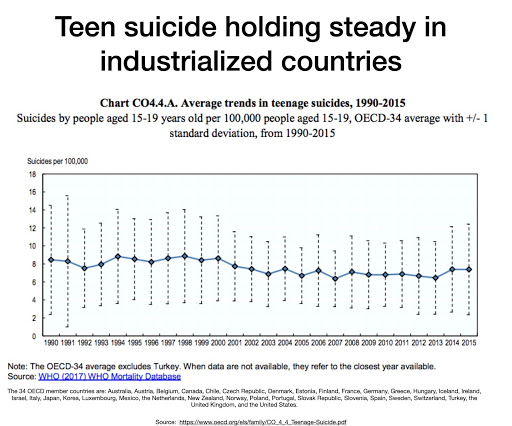I’m dismayed by ongoing silence re: misinformation in #TheSocialDilemma.
For instance, the film uses the graph below to “prove” more iPhones → more teen suicides.
Actual fact: Social media affects teen depression as much as (drumroll please) EATING POTATOES.
I’ll explain 👇
For instance, the film uses the graph below to “prove” more iPhones → more teen suicides.
Actual fact: Social media affects teen depression as much as (drumroll please) EATING POTATOES.
I’ll explain 👇

The film presses a causal link between the rise of social media apps on phones (2009) & the rise in teen suicide. For any parent watching, it’s a HORRIFYING image.
But, if social media is the cause, there should be a rise in suicides *wherever* teens use it.
There isn't.
But, if social media is the cause, there should be a rise in suicides *wherever* teens use it.
There isn't.
First, the rise in teen suicide is mostly an American problem.
Of course, even one death is too many—but, for almost all other nations, the trend lines don't point to concerning correlations.
Of course, even one death is too many—but, for almost all other nations, the trend lines don't point to concerning correlations.

Look at this more nuanced graph from the USA.
Yes, teen suicide is rising in the USA (up from record lows). But if social media is the cause—or even a leading cause—it should be rising *everywhere* teens use it.
It isn’t.
This uptick is coming mainly from RURAL America.
Yes, teen suicide is rising in the USA (up from record lows). But if social media is the cause—or even a leading cause—it should be rising *everywhere* teens use it.
It isn’t.
This uptick is coming mainly from RURAL America.

Here’s another graph, showing suicide trends in America’s heartland. “Social media” by itself doesn’t come close to explaining these disparities. What else is going on? 

Singling out social media as the cause of suicide ignores so many important factors, like access to mental health services, economic disparities, and (most obviously) the fact that 2009 was the year that the number of guns overtook the number of people in the USA: 

On top of that, the % of LGBTQ youth who say they've attempted suicide dropped 25% since 2009. Why? What if social media helps these teens, as a way to find acceptance?
The film doesn’t explore this, instead cherry-picking numbers to serve its story.
usnews.com/news/health-ne…
The film doesn’t explore this, instead cherry-picking numbers to serve its story.
usnews.com/news/health-ne…
Teen suicide is a heart-wrenching issue, and the filmmakers know it. They wanted an emotional reaction, and they did so at the expense of honesty.
I’m not the only one who noticed. Here’s Rory O’Connor, a suicidal behaviour researcher @suicideresearch:
I’m not the only one who noticed. Here’s Rory O’Connor, a suicidal behaviour researcher @suicideresearch:
https://twitter.com/suicideresearch/status/1312138641435627520
Bottom line: I support moderating teens’ use of tech. But such BS claims take our attention off of the REAL problems. It’s more than deceptive. It’s deadly.
Parents need to know this.
More re: teen depression, tech, and the movie: nirandfar.com/social-media-a…
Parents need to know this.
More re: teen depression, tech, and the movie: nirandfar.com/social-media-a…
• • •
Missing some Tweet in this thread? You can try to
force a refresh




